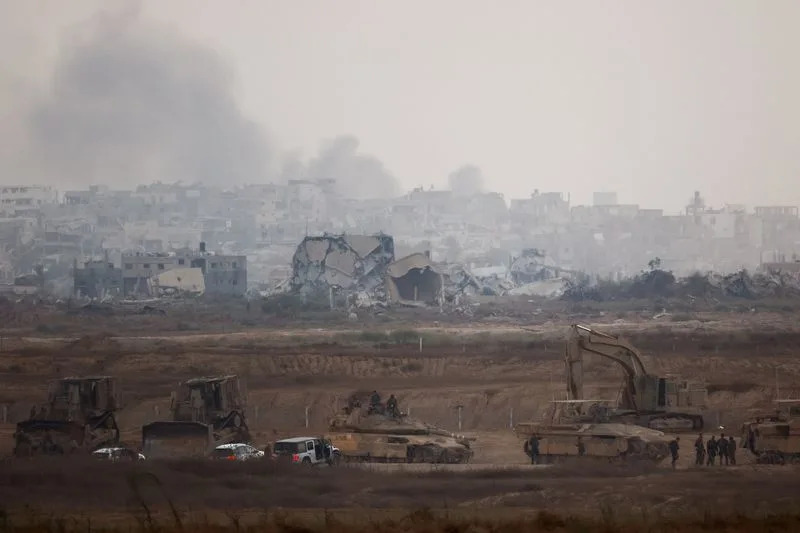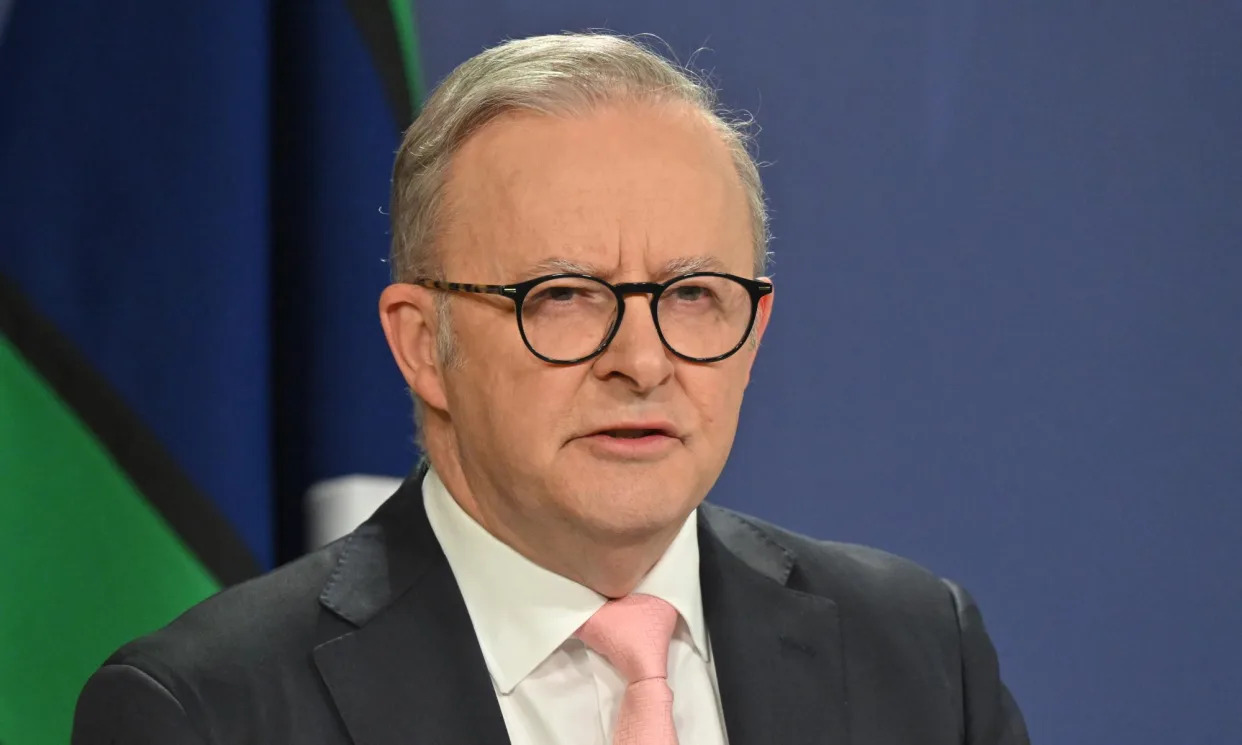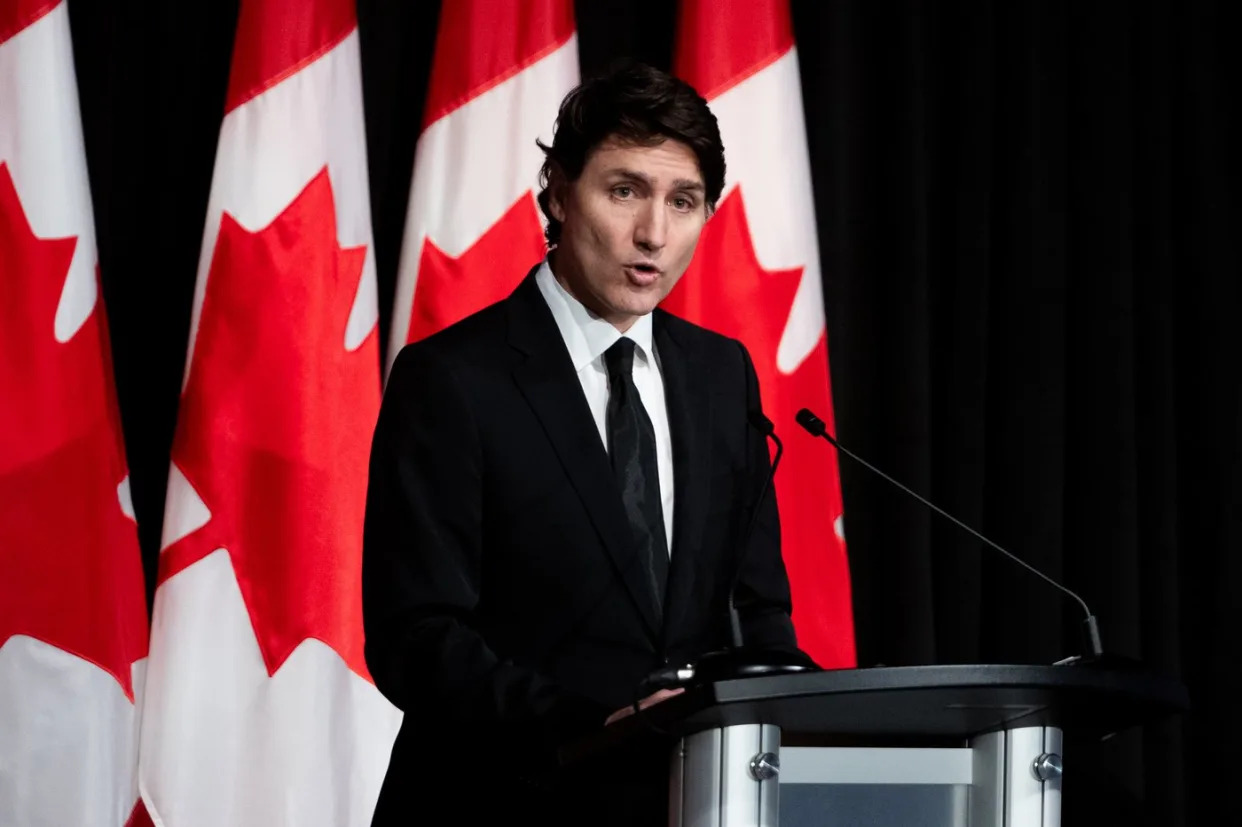HALF OF FIVE EYES
Australia, NZ, Canada call for ICJ response from Israel, Gaza ceasefireLewis Jackson
Fri, July 26, 2024

Israeli military troops prepare near the Israel-Gaza border
By Lewis Jackson
SYDNEY (Reuters) -Australia, New Zealand and Canada on Friday called for an immediate ceasefire in Gaza and asked Israel to respond to a United Nations court which last week ruled its occupation of Palestinian territories and settlements there were illegal.
"Israel must listen to the concerns of the international community," the leader's statement said.
"The protection of civilians is paramount and a requirement under international humanitarian law. Palestinian civilians cannot be made to pay the price of defeating Hamas. It must end."
The leaders also said Israel needed to hold extremist settlers accountable for ongoing acts of violence against Palestinians, reverse its settlement program in the West Bank and work towards a two-state solution.
Israel's embassy in Australia on Thursday said it condemned acts of violence against Palestinian communities.
Last week, the International Court of Justice (ICJ) said Israel's occupation of Palestinian territories and its settlements there are illegal and should be withdrawn as soon as possible, its strongest findings to date on the Israel-Palestinian conflict.
The leader's statement called on Israel to "respond substantively" to the ICJ.
Israel's foreign ministry last week rejected the ICJ opinion as "fundamentally wrong" and one-sided, and repeated its stance that a political settlement in the region can only be reached by negotiations.
Israel captured the West Bank, Gaza Strip and East Jerusalem - areas of historic Palestine which the Palestinians want for a state - in the 1967 Middle East war and has since built settlements in the West Bank and steadily expanded them.
Israeli leaders argue the territories are not occupied in legal terms because they are on disputed lands, but the United Nations and most of the international community regard them as occupied territory.
The joint statement, the second since February, expressed concern about escalating violence between Israel and Hezbollah and said the risk of a wider regional war made a ceasefire in Gaza all the more urgent.
The statement came hours after U.S. Vice President Kamala Harris pressured Israeli Prime Minister Benjamin Netanyahu to help reach a Gaza ceasefire deal that would ease the suffering of Palestinian civilians, striking a tougher tone than President Joe Biden.
(Reporting by Lewis Jackson in SydneyEditing by Alasdair Pal and Sharon Singleton)
Australia, Canada and New Zealand leaders urge ceasefire in Gaza to end ‘catastrophic’ situation
Daniel Hurst Foreign affairs and defence correspondent
Fri, July 26, 2024

Anthony Albanese has joined with his Canadian and New Zealand counterparts to call for a ceasefire in Gaza.Photograph: Mick Tsikas/AAP
The prime ministers of Australia, Canada and New Zealand have declared that a ceasefire in Gaza is “needed desperately” and urged Israel to “listen to the concerns of the international community”.
In a strongly worded joint statement issued on Friday, the three leaders said they were “gravely concerned about the prospect of further escalation across the region”, including between Hezbollah and Israel.
The Australian prime minister, Anthony Albanese, joined with Justin Trudeau of Canada and Christopher Luxon of New Zealand to warn that further hostilities would “put tens of thousands of civilians in Lebanon and Israel at risk”.
Related: Labor seeks to avoid controversy over Palestine at NSW conference amid grassroots pressure
They said an escalation of conflict across Israel’s northern border with Lebanon would have “disastrous consequences” for both countries, and that “only makes a ceasefire in Gaza more urgent”.
Friday’s statement urged “all involved actors to exercise restraint and de-escalate”.
It also included some strong language directed at Israel in the wake of last week’s international court of justice ruling that the continued occupation of territory Israel seized in 1967, including the West Bank, was illegal under international law.
“We call on Israel to respond substantively to the ICJ’s advisory opinion, and ensure accountability for ongoing acts of violence against Palestinians by extremist settlers, reverse the record expansion of settlements in the West Bank which are illegal under international law, and work towards a two-state solution,” the three prime ministers said.
To date, the Israeli government has labelled the ICJ ruling as “not legally binding” and “blatantly one-sided”.
Friday’s statement reflects shared concerns among Australia, Canada and New Zealand regarding the toll of the war in Gaza and the risk of escalation across the Middle East.
These countries are all members of the Five Eyes western intelligence alliance, along with the US and the UK.
Related: The bombshell legal ruling that made it impossible for Australia to delay sanctions against Israeli settlers
It was the third time the prime ministers of Australia, Canada and New Zealand have issued a joint statement about developments in the Middle East.
In December, the same leaders pressed for “a sustainable ceasefire”. In February, they spoke out against the prospect of an Israeli ground offensive in Rafah in southern Gaza.
The new statement on Friday described the situation in Gaza as “catastrophic” and said the human suffering was “unacceptable” and “cannot continue”.
The three prime ministers said they remained “unequivocal in our condemnation of Hamas for the atrocities of October 7 and ongoing acts of terror”, urging the group to “lay down its arms and release all hostages”.
The prime ministers said Israel “must listen to the concerns of the international community”, noting that the protection of civilians was “paramount and a requirement under international humanitarian law”.
“Palestinian civilians cannot be made to pay the price of defeating Hamas. It must end,” the statement said.
The prime ministers said they stood fully behind “the comprehensive ceasefire deal” that was outlined by the US president, Joe Biden, in late May and subsequently endorsed by the UN security council.
They called on all parties “to agree to the deal” and warned that any delay in securing a ceasefire would “only see more lives lost”.
The Israeli prime minister, Benjamin Netanyahu, heard a similar message from the US vice president and presumptive Democratic presidential nominee, Kamala Harris, in Washington on Thursday.
Albanese, Trudeau and Luxon reiterated that they were “committed to working towards an irreversible path to achieving a two-state solution, where Israelis and Palestinians can live securely within internationally recognised borders”.
“This is the only realistic option to achieve a just and enduring peace,” they said.
The president of the Zionist Federation of Australia, Jeremy Leibler, criticised the statement. He said any attempt to pressure Israel “to end the war unilaterally only serves to embolden Hamas and prolong the war”.
But the leader of the Australian Greens, Adam Bandt, said the government must take action beyond issuing statements calling for a ceasefire deal.
Bandt called on the Australian government to impose sanctions on the Israeli government “as Netanyahu sees no consequences and the slaughter continues”.
Canada calls for Israeli response to ICJ advice on occupied Palestinian territory
Laura Osman
Fri, July 26, 2024

OTTAWA — Prime Minister Justin Trudeau called for Israel to "respond substantively" to the top United Nations court's recent advisory opinion that Israel's presence in the occupied Palestinian territories is unlawful and that it should end.
The International Court of Justice's non-binding opinion released last week was an unprecedented, sweeping condemnation of Israel's rule over the lands it captured 57 years ago.
Trudeau responded to the court's advice as part of a joint statement from Canada, Australia and New Zealand on Friday, calling for the reversal of settlements in the West Bank.
The statement, released by the Prime Minister's Office, calls on Israel to "ensure accountability for ongoing acts of violence against Palestinians by extremist settlers, reverse the record expansion of settlements in the West Bank which are illegal under international law, and work towards a two-state solution."
Israeli Prime Minister Benjamin Netanyahu quickly denounced the non-binding opinion last week, and insisted the territories are part of the Jewish people’s historic homeland.
In written submissions, Israel said the questions put to the court fail to address Israeli security concerns. Israeli officials have said the court's intervention could undermine the peace process, which has been stagnant for more than a decade.
“The Jewish people are not conquerors in their own land — not in our eternal capital Jerusalem and not in the land of our ancestors in Judea and Samaria,” Netanyahu said in a statement issued by his office last week, using the biblical terms for the West Bank.
“No false decision in The Hague will distort this historical truth and likewise the legality of Israeli settlement in all the territories of our homeland cannot be contested.”
The court said Israel had no right to sovereignty in the territories, was violating international laws against acquiring territory by force and was impeding Palestinians’ right to self-determination.
It said other nations were obliged not to "render aid or assistance in maintaining" Israel’s presence in the territories.
The statement by Canada, Australia and New Zealand did not promise any particular action or changes to their own policies or relationships with Israel.
"Israel must listen to the concerns of the international community," the statement reads.
The court's advice was released as Israel faces increasing global criticism for the deaths and suffering of thousands of Palestinians in the Gaza Strip, which has been ravaged by the conflict between Israel and Hamas.
"The protection of civilians is paramount and a requirement under international humanitarian law. Palestinian civilians cannot be made to pay the price of defeating Hamas. It must end," the countries said in the statement.
Canada, Australia and New Zealand renewed calls for an immediate ceasefire, and said they stand behind a proposed deal outlined by United States President Joe Biden and endorsed by the UN Security Council.
"We call on parties to the conflict to agree to the deal. Any delay will only see more lives lost," they said.
Canada, Australia and New Zealand say Hamas must lay down its arms and release all Israeli hostages, and that they see no role for Hamas in the future governance of Gaza and an eventual two-state solution.
Israel's ambassador to Canada, Iddo Moed, said calling for a two-state solution at this time doesn't coincide with the reality in the region or offer practical help to Palestinians.
The end of the hostilities in Gaza is contingent on Hamas releasing more than 100 hostages, laying down arms and no longer using Palestinian civilian shields, he said in a statement Friday.
"Israel will continue to defend itself against hostile attacks on seven fronts, all directed by Iran through its proxies in the region," Moed said in the statement.
"We call upon Canada, as a nation that values international law and institutions that uphold it, to do all it can to prevent those who try to disrupt global order from achieving their goals."
The conflict in Gaza began after Hamas launched a terrorist attack in Israel on Oct. 7 that killed an estimated 1,200 people. The Hamas-run Health Ministry in Gaza says more than 39,100 Palestinians have been killed in the war.
In the joint statement, the three countries expressed concern about the prospect of the conflict escalating and expanding as a result of attacks on Israel by Iran and the Houthis, and the unstable and increasingly hostile situation at the Lebanese border between Israel and the terrorist organization Hezbollah.
This report by The Canadian Press was first published July 26, 2024.
— With files from The Associated Press
Laura Osman, The Canadian Press
No comments:
Post a Comment